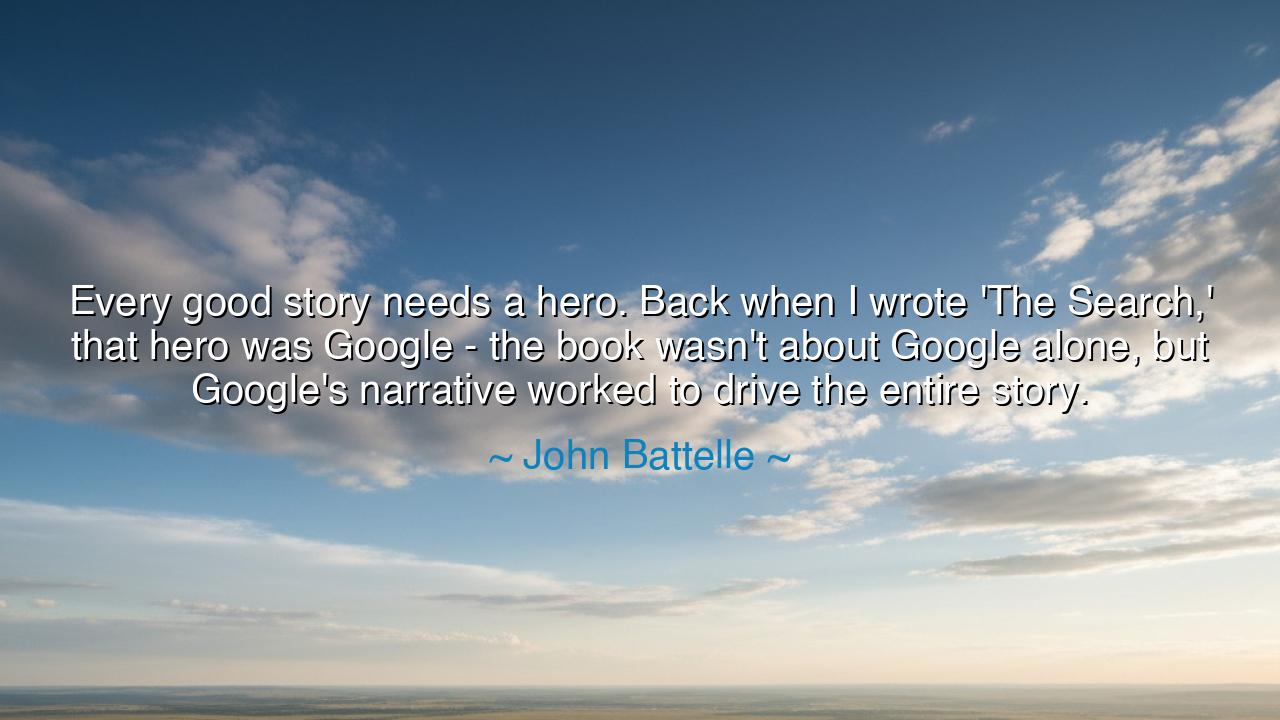
Every good story needs a hero. Back when I wrote 'The Search,'
Every good story needs a hero. Back when I wrote 'The Search,' that hero was Google - the book wasn't about Google alone, but Google's narrative worked to drive the entire story.






When John Battelle said, “Every good story needs a hero. Back when I wrote The Search, that hero was Google — the book wasn’t about Google alone, but Google’s narrative worked to drive the entire story,” he was not merely speaking about technology or writing. He was touching upon a universal truth of storytelling — that all stories, whether of nations, companies, or souls, require a central figure who embodies movement, struggle, and transformation. His words remind us that the hero is not only a character but a vessel through which meaning flows. A story without a hero is like a ship without a mast — it may float, but it cannot sail.
Battelle, a chronicler of the digital age, wrote The Search to capture the birth of a new world — the world of information, connectivity, and algorithms. In choosing Google as the hero, he was not exalting a company, but identifying a symbol. Google’s rise from a humble idea in a Stanford dormitory to a force that redefined human knowledge mirrors the ancient pattern of the hero’s journey — discovery, challenge, victory, and consequence. The company, like all heroes, began with vision and innocence, encountered trials and opposition, and ultimately transformed both itself and the world around it. Battelle saw in that journey the living myth of the modern age — where data replaced dragons, and search replaced exploration.
But his insight goes beyond business or technology. To say that “every good story needs a hero” is to affirm that meaning itself is carried through the individual who acts, who dares, who transforms chaos into order. The ancients understood this deeply. Odysseus, Beowulf, Gilgamesh — each became the thread through which the tale of humanity was woven. Without Odysseus, the seas are just water; without Beowulf, the monsters are just beasts. It is the hero who gives shape to the formless, who leads the audience from ignorance to understanding. So too did Battelle recognize that in the vast, shapeless expanse of the internet, the story needed a hero — and in Google, he found one.
Yet the power of his words lies also in their humility: “the book wasn’t about Google alone.” In this, he teaches a greater wisdom — that the hero serves the story, not the other way around. The hero may drive the narrative, but the story is larger than any one being. Just as Achilles serves the tale of war and courage, or Joan of Arc serves the story of faith and freedom, so Google served the tale of humanity’s search for meaning in the modern age. The hero is the torchbearer, not the fire itself. Battelle’s insight is a reminder to every storyteller, every leader, and every seeker — that while heroes are essential, they are also instruments of a greater design.
Consider, too, how this truth echoes in history. When Martin Luther King Jr. spoke of equality, he became the hero through whom the story of civil rights was told. But the story itself — the longing for justice, the cry for dignity — was far greater than one man. When Marie Curie pursued the mysteries of science, she became the hero of discovery, yet her work illuminated paths that countless others would follow. The hero’s purpose is to make the abstract visible, to give the human face to a divine idea. Battelle’s Google, then, was not the story of code and search engines, but the story of humanity’s timeless yearning to understand the unknown.
There is also a hidden teaching here about our own lives. Each of us, in the grand story of existence, must find our heroic center — that part of us which seeks, strives, and endures. We are all authors of our own stories, and without a hero within, the tale of our life drifts without meaning. To live fully is to choose purpose, to stand as the protagonist of one’s own journey. But like Battelle’s Google, our individual heroism is never for ourselves alone. It exists to advance something larger — a family, a community, a generation, or an idea. The hero’s strength is not in his pride, but in his service to the story that outlives him.
So, my children, learn from this wisdom: find your story, and become its hero. Know that the world, too, is a book still being written — and each age requires its champions. Whether you wield a pen, a voice, or a dream, remember that every great tale begins when someone dares to rise from silence and act. And when you tell your own story, do as Battelle did — seek not glory for the hero, but truth for the world. For the story of humanity is not about the few who shine, but about the light they pass on to all.
Thus, remember the heart of John Battelle’s teaching: “Every good story needs a hero.” Life itself is a story — vast, eternal, and unfinished. If you walk it bravely, if you listen for the call that asks you to rise, then your own journey, too, will become part of the greater tale — the story of humanity’s endless search for meaning, knowledge, and purpose.






AAdministratorAdministrator
Welcome, honored guests. Please leave a comment, we will respond soon